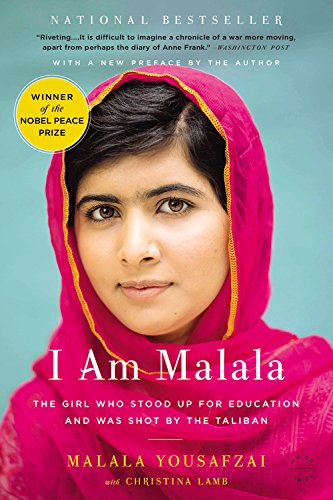All Nonfiction
- Bullying
- Books
- Academic
- Author Interviews
- Celebrity interviews
- College Articles
- College Essays
- Educator of the Year
- Heroes
- Interviews
- Memoir
- Personal Experience
- Sports
- Travel & Culture
All Opinions
- Bullying
- Current Events / Politics
- Discrimination
- Drugs / Alcohol / Smoking
- Entertainment / Celebrities
- Environment
- Love / Relationships
- Movies / Music / TV
- Pop Culture / Trends
- School / College
- Social Issues / Civics
- Spirituality / Religion
- Sports / Hobbies
All Hot Topics
- Bullying
- Community Service
- Environment
- Health
- Letters to the Editor
- Pride & Prejudice
- What Matters
- Back
Summer Guide
- Program Links
- Program Reviews
- Back
College Guide
- College Links
- College Reviews
- College Essays
- College Articles
- Back
I Am Malala by Malala Yousafzai
“A truly great book is a book that changes and molds you into a better version of yourself,” said my English teacher one fall afternoon. If I had to think about a truly great book that miraculously entered my life, I would pick the story of Malala Yousafzai. The day that I picked up her autobiography, I Am Malala: The Girl Who Stood Up for Education and Was Shot by the Taliban, was the day that I opened my eyes to the injustice and inequality in her life, as well as in my own, that I had never questioned before. Malala Yousafzai, an eleven year old Pakistani girl, started an anonymous blog detailing her life and more specifically the denial of her education by the Taliban’s occupation of the area near her home. Soon she risked her life and spoke out publicly for the importance of education for girls, as well as gender inequality in her culture and around the world. Today she is 19 years old, and even after being shot by the Taliban at age 15, continues to advocate for the equal education and treatment of girls around the world.
Though I have not lived in a terrorist-occupied area, or been shot for using my voice, I have also faced injustice because of my gender. As a Bengali girl, my culture expects women and girls to dress in a way that hides their body as much as possible. We are expected to speak, behave, and act gracefully and gentle, and value men more than ourselves., Walking down the street in my Bengali neighborhood means to be looked upon,inspected by, and spoken about by all those around you. “Is my outfit too tight or short?” and “Do I look too ‘western?’” are just some of the questions I have to ask myself every morning before I leave my house. And for many years, I accepted this ideology. But after truly realizing that such judgement is immoral, I have now become one to always speak up for equality for, not just women, but for all people. In 8th grade, I entered into an intense argument with one of my neighbors, regarding the Pakistani model Qandeel Baloch’s murder. I rejected the idea that it was justified to kill a woman simply because her clothing and actions were “immodest,” according to cultural standards. Before I read Malala’s book, I do not think I would have viewed this as wrong, as I have been shaped by the people on my block--the very block named after a saint, St. Peters street. But my eyes have been opened, and I doubt they will ever close, because the story of Malala Yousafzai has become one that I am able to parallel to my own.
Similar Articles
JOIN THE DISCUSSION
This article has 0 comments.


I think of myself as a fighter. A fighter for what? Justice. And that is something Malala is also fighting for. Justice, and equality. Is that too much to ask for?